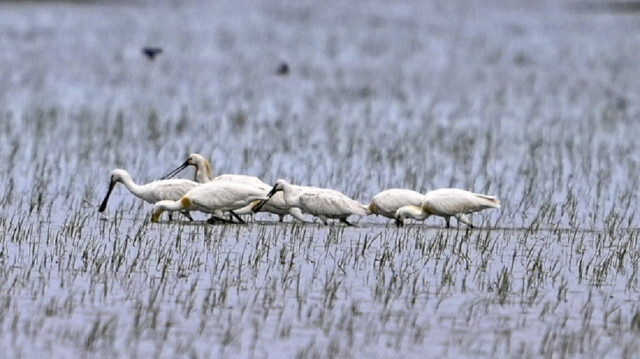
Kizilrmak Delta in northern province of Samsun home to 365 bird species
The Kizilirmak Delta, home to 365 bird species and being considered for UNESCO World Heritage, also serves as a habitat for endangered species in Türkiye's northern Samsun province.
The delta sits within the Kizilirmak Basin, one of Türkiye's 26 basins, with unique natural conditions on both the west and east coasts, having led to the formation of various-sized lakes, according to Mustafa Guler, the president of the Kizilirmak Delta Wetland and Bird Sanctuary Area.
Guler said that the Kizilirmak Delta, with "10 lakes on the eastern shore and 2 on the western shore. The delta has a plain character, consisting mostly of gravel, sand, silt, clay, and alluvial soils as a result of the accumulation of materials eroded by rivers in places with very little slope.
"It is known that there are 500 bird species in Türkiye, and the Kizilirmak Delta is a highly important area in terms of bird presence. So far, 365 bird species have been identified in the area. This accounts for approximately 75% of the birds in Türkiye," he said.
Guler added that the Kizilirmak Delta is crucial for "bird breeding, wintering, and migration," stressing the importance of the delta for birds migrating in autumn and spring.
"In winter, the delta becomes home to a population of 100,000 to 150,000 waterfowl. A research study conducted in 1992 revealed that around 140 bird species, with 88 confirmed, were nesting within the delta's habitat."
He also said that the area is home to 157 bird species, including the Great Bustard, Purple Heron, Black Stork, Spoonbill, Common Pochard, Water Rail, Red-crested Pochard, Ferruginous Duck, Smew, Short-toed Snake Eagle, Crane, Bearded Reedling, Black-winged Stilt, Black-headed Gull, Marsh Harrier, and Grasshopper Warbler.
"It has been determined that 18 of the bird species identified in the area, out of those considered for inclusion in the UNESCO World Heritage Permanent List, are under the threat of extinction, while 21 are nearing endangerment," Guler concluded.

